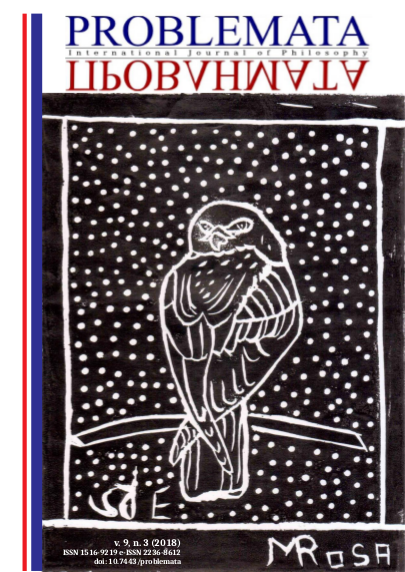MINOR EDUCATION AND WORKSHOP OF CONCEPTS: THE PHILOSOPHY TEACHING AS RESISTANCE TO THE "SOCIETIES OF CONTROL"
DOI:
https://doi.org/10.7443/problemata.v9i3.41658Keywords:
Minor education. Philosophy teaching. Workshop of concepts. Resistance. Control societies.Abstract
This paper aims to analyze the Philosophy teaching as an enterprise of a minor education. The notion of minor education refers to a Sílvio Gallo`s appropriation of the concept of minor literature which appears in the book about Kafka written by Deleuze and Guattari. A minor education would be some kind of a resistance against the major education models represented by law regulations and State institutions and its ideological apparatus. The Philosophy teaching as a minor education serves as an alternative to the educational model as an instrument of State disciplinary and control dispositive on individuals. If the major education is machinery which produces serial individuals, without a face, the function of a minor education is to obstruct the machinery functioning, to resist its operational standard and to provide a learning environment that creates new learning and existence possibilities. Thorough this approach Philosophy lessons will assume the Deleuze and Guattari’s conception of Philosophy as a concepts creator in opposition to the encyclopedic teaching method. The students will have access to the philosophical critical thinking experience, and along with their teachers they will be able to questioning and problematizing reality and the state of affairs, giving them a new meaning and create the new, resisting the domination models of the “control societies”.
Downloads
References
ASPIS, Renata; GALLO, Sílvio. Ensinar filosofia: um livro para professores. São Paulo: Atta Mídia e EDUCAÇÃO, 2009.
BRASIL. Ministério de Educação e Cultura. Medida provisória nº 746, de 22 de setembro de 2016. Altera a Lei nº 9.394 que estabelece as diretrizes e bases da Educação Nacional. Brasília: MEC, 2016. Disponível em: <http://www.mec.gov.com.br>. Acesso em: jun. de 2017.
CERLETTI, Alejandro. O ensino de filosofia como problema filosófico. Trad. Ingrid Muller Xavier. Belo Horizonte: Autêntica Editora, 2009.
DELEUZE, Gilles; GUATTARI, Félix. (1992). O que é a filosofia? 3ª. ed. Tradução de Bento Prado Jr. E Alberto Alonso Munõz. Rio de Janeiro: Editora 34, 2010. (Coleção TRANS).
______. (1975). Kafka: por uma literatura menor. Belo Horizonte: Autêntica, 2015.
DELEUZE, Gilles. (1992). Post-Scriptum sobre as sociedades de controle. In: DELEUZE, Gilles.(1992) Conversações (1972-1990). 3ª. ed. Trad. Peter Pàl Pelbart. Rio de Janeiro: Editora 34, 2013.
GALLO, Silvio. Metodologia do ensino de filosofia: Uma didática para o ensino médio. Campinas: Papirus, 2012.
______. (2003). Deleuze & a Educação. 3ª. ed. Belo Horizonte: Autêntica, 2016. (Pensadores & Educação)
KOHAN, Walter Omar. Filosofia: O paradoxo de ensinar e aprender. Trad. Ingrid Muller Xavier. Belo Horizonte: Autentica Editora, 2009.
Downloads
Published
Issue
Section
License
Authors who publish with this journal agree to the following terms:
- Authors retain copyright and grant the journal right of first publication with the work simultaneously licensed under a Creative Commons Attribution License that allows others to share the work with an acknowledgement of the work's authorship and initial publication in this journal.
- Authors are able to enter into separate, additional contractual arrangements for the non-exclusive distribution of the journal's published version of the work (e.g., post it to an institutional repository or publish it in a book), with an acknowledgement of its initial publication in this journal.
-
- Authors are permitted and encouraged to post their work online (e.g., in institutional repositories or on their website) prior to and during the submission process, as it can lead to productive exchanges, as well as earlier and greater citation of published work (See The Effect of Open Access).





